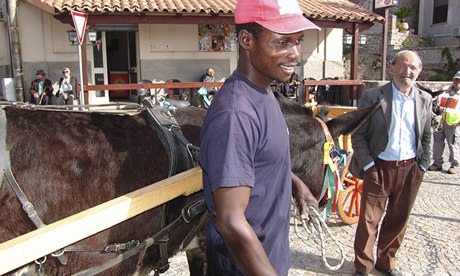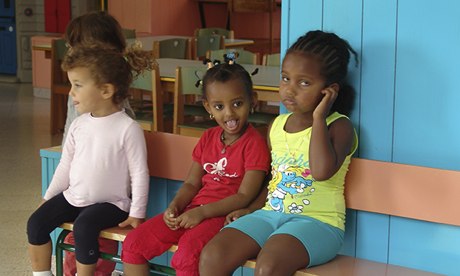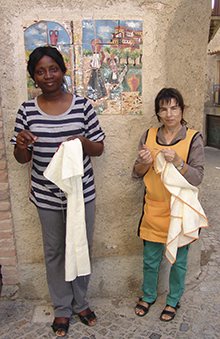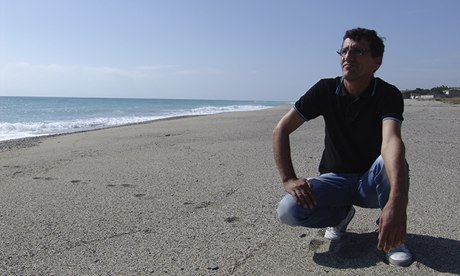As yet another boat filled with desperate migrants tragically capsizes in the Mediterranean, Tom Kington finds one mainland community that has secured its own future by offering them homes and job

Daniel Yaboah from Ghana with one of the council donkeys that he looks after in Riace, Italy. Photograph: Francesco Sorgiovanni for The Observer
In an ancient palazzo in the toe of Italy, the mayor banged his fist on the table as he set about organising a candlelit vigil for the hundreds of migrants who drowned this month trying to reach the island of Lampedusa. "We need to show it that it has touched us all," said Domenico Lucano, "but we mustn't just weep – that is not enough."
As mayor of Riace, a small village in Calabria, Lucano has spent a decade trying to do something real to help the asylum seekers who risk their lives on rickety boats. The resettlement programme he has set up is one the European Union would do well to study as it wakes up to the waves of refugees pouring into Europe from Eritrea, Somalia, Syria, Afghanistan and Iraq.
Lucano, a hyperactive former schoolteacher who looks younger than his 54 years, walked out on to the balcony of the palazzo perched over the winding alleys of Riace that he has turned into a "welcome centre" for immigrants, offering Italian classes to children, setting up parents with jobs and handing out tokens that can be exchanged for food in local shops.
"That house has been taken by an Egyptian family, that one by an Eritrean family," he says proudly, jabbing his finger at the tiled rooftops of the village, which is now home to 180 refugees.
Lucano sprang into action in 1998 when 200 Kurds fleeing the savage Turkish-Kurdish conflict landed on a beach near Riace. Instead of watching them get packed off to one of Italy's grim holding centres, he offered them houses in the village that had been abandoned as the local population dwindled.
"My parents always taught me to welcome strangers," he said.
 Children at Riace’s nursery school. Photograph: Francesco Sorgiovanni for the Observer
Children at Riace’s nursery school. Photograph: Francesco Sorgiovanni for the Observer
As more migrants followed, the local school was saved from closure as their children enrolled. This term, the nursery school boasts eight nationalities. "Integration is spontaneous, and the foreign kids are sharp – they learn faster than the Italians," said one teacher, Anna Niciforo.
After school last week, a gaggle of African children heading home with their satchels waved at the elderly Italian men lined up on chairs for a gossip outside the barber shop.
"The village was in danger of becoming extinct as people disappeared to northern Italy for jobs during the economic boom," said Lucano. "One village near Turin has more people from Riace than Riace itself."
Lucano describes the Italians who work with him in the centre as "potential emigrants who didn't leave", thanks to the migrant scheme. The centre is a mix of races. As he spoke a grey-bearded Egyptian Coptic priest wandered in, handing out homemade bread before heading out to hold Orthodox mass for Christian Africans in the local church.
Working with the team as an interpreter is Ethiopian Lemlem Tesfahun, 31, who recalled how Lucano drove her to Riace a decade ago from an immigrant holding centre in Calabria. "It was like a jail there," she said. "I didn't know where I was and cried every day to be released."
Today, local funding has spurred the opening of artisan workshops where migrants can earn a wage learning trades that were dying out locally. At the glassmaker just past the ceramics workshop, an Afghan woman who fled the Taliban is concentrating on a glass mosaic, while across the street at the embroidery shop, Nigerian Tayo Amoo, 34, is learning the tricks of the trade from a Riace woman who originally learned her skills from local nuns.
 Tayo Amoo, apprentice embroiderer. Photograph: Francesco Sorgiovanni for the Observer
Tayo Amoo, apprentice embroiderer. Photograph: Francesco Sorgiovanni for the Observer
Formerly a journalist in Nigeria, Amoo says she was briefly jailed at home following accusations of insulting Islam, and fled to Italy in 2010. Now, a year after being granted asylum, she is making a go of needlework, as her 15-month-old daughter plays at her feet.
Ghanaian Daniel Yaboah is paid €800 a month to tend the donkeys that haul carts up and down the narrow alleys collecting household rubbish for recycling. With a stable of 13 animals, the next step is to sell donkey's milk.
While Lucano waits to hear if the Italian government will send him any of the 155 survivors from the vessel that sank off Lampedusa more than a week ago, and as Italy reels from another fatal sinking on Friday 60 miles from the same island, a group of Eritreans has arrived after surviving a panicked landing in Sicily last month, where 13 drowned as they tried to leap from their vessel. "They have given us everything here – so far so good," said Fasil Hidad, 46, who was still nursing a bruised eye after being punched by his minders when he refused to get on the overloaded boat as it prepared to leave Libya. Now, after leaving his wife and children in Eritrea to escape the country's brutal military conscription, and after handing over $7,400 for the trip over desert and sea to Italy, he said he was itching to work.
Lucano's efforts have not been universally appreciated. Apparently irked by his growing influence, the local 'Ndrangheta mafia shot through the windows of a restaurant where he was eating in 2009 and poisoned two of his dogs. Last year, a bureaucratic error temporarily halted funding for the migrant programme, which meant shopkeepers refused to accept immigrants' tokens. As mothers ran out of milk for their children, protesting migrants blocked the highway with upturned rubbish bins and Lucano threatened to go on hunger strike.
Even when the funding flows smoothly, many refugees choose to move on from Riace when their asylum papers come through. "There are no opportunities in Italy – I need to get to Holland to carry on my veterinary studies," said Eritrean Awtsana Issak Kahsay, 29, who arrived on the same boat as Hadid.
Locals admit that goodwill towards migrants is partly linked to the government funding they bring – €25 to €30 per migrant per day – and the social service jobs they generate. "Many people here are unemployed, so this means work for us too," said Monica Audino, who works for an agency helping new arrivals file asylum claims and find accommodation.
But whatever the hurdles, Riace's experiment marks a dramatic U-turn away from Calabria's traditional fear of foreigners following centuries of attacks by pirates. This is why villages such as Riace were built up in the hills, away from the vulnerable coast.
"Whatever the challenges, this has to be a better solution for migrants than being locked up in a holding centre where their children cannot go to school," said local Francesca Salerno.
 Bahram Acar, a Kurd who arrived by accident in Riace while fleeing the Turkish-Kurdish conflict in the 1990s. Photograph: Francesco Sorgiovanni for the Observer
Bahram Acar, a Kurd who arrived by accident in Riace while fleeing the Turkish-Kurdish conflict in the 1990s. Photograph: Francesco Sorgiovanni for the Observer
Bahram Acar, one of the Kurds from the first boat, back in 1998, said he had found support to find a job as a builder, raise a family and get Italian citizenship. Fifteen years on, still in Riace, he is working to help new arrivals settle in.
"It all started with me," he said. "I was helped, and now I am helping."

Sign up for the Guardian Today
Our editors' picks for the day's top news and commentary delivered to your inbox each morning.
Sign up for the daily email
No comments:
Post a Comment